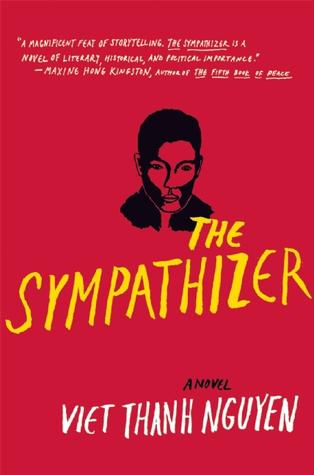 The Sympathizer is a first novel by Viet Thanh Nguyen, which won last year’s Pulitzer Prize for literature. It’s a fascinating look at the Vietnam War and its aftermath from the perspective of the Vietnamese. Right away it makes you realize how much Americans only see the Vietnam War from our own perspective, not those of the people who lived and fought there.
The Sympathizer is a first novel by Viet Thanh Nguyen, which won last year’s Pulitzer Prize for literature. It’s a fascinating look at the Vietnam War and its aftermath from the perspective of the Vietnamese. Right away it makes you realize how much Americans only see the Vietnam War from our own perspective, not those of the people who lived and fought there.
The story is told from the perspective of a man who is a double agent, so we see both sides of the conflict. The narrator, who is never named, works for the General and flees Vietnam with him when the communist army takes over; but he’s secretly working for the communists. The book opens as he’s writing his confession, so he’s clearly been captured – but by which side? Much of this story plays on dual identities and at the same time, the lack of real identity. Like our narrator, many of the characters are not named or given an impersonal nickname, which presumably makes betrayal and killing a bit easier. No one in this book is innocent, nor is anyone clearly a villain.
Continuing the dual nature of this story, our narrator lives much of his life in Vietnam, but a good amount of the story takes place in America. As a “sympathizer”, he tries very hard to blend in and congratulates himself on his American education and excellent diction. Yet he finds that, to white Americans, it doesn’t matter how well you speak, they still see you as a foreigner. We see his experiences as both a refugee and a Viet Cong spy. He hates Americans for what they did to his country, and also for the way he sees Asians are treated in America.
In another plot within plot (this book is really layered), the narrator becomes a consultant on a major Hollywood film about the Vietnam War. This allows Nguyen to openly comment on the skewed picture Americans have of Vietnam, which of course comes mostly from Hollywood. For example, he’s horrified to find out that the director plans to make a movie about Vietnam without a single line for a Vietnamese character. But when he protests, the Vietnamese actors are given over-the-top, stereotypical roles instead of none at all.
While the book may sound a bit heavy-handed at times, it’s written with humor and sarcasm as well as genuine emotion, and the book is quite readable. It gave me a lot to think about.
It won’t surprise you that a book that deals with the Vietnam War and espionage is fairly violent, even though most of the book is set in the aftermath of the War. I think Nguyen doesn’t want to sugarcoat anything his protagonist experiences. It’s difficult to read, especially because the violence is very personalized. What I mean is that it’s not mass violence, but up close and personal violence, sometimes perpetrated against a character our narrator has gotten to know. Faceless violence is much easier to live with.
Nguyen is a Professor of English and American Studies and Ethnicity at the University of Southern California. He was born in Vietnam and came to the U.S. with his family in 1975. He’s published several works of nonfiction and his latest work is a critically acclaimed book of short stories called The Refugees. You can read what he has to say about winning the Pulitzer Prize here.
I knew little to nothing about Vietnam before reading this book. This was definitely a book outside of my comfort zone, but one I’m glad I read, and I can definitely see why it merited a Pulitzer Prize. It’s not only powerful historical fiction but reminded me of classics 1984 and Invisible Man as well. I’m counting it towards my Reading All Around the World challenge, as well as the 20 Books of Summer challenge.

